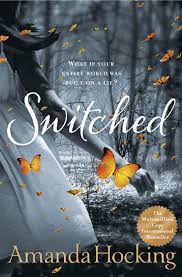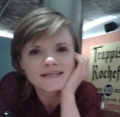You have no items in your cart. Want to get some nice things?
Go shoppingWhat’s the secret of YA fiction’s recent stellar success? Eleanor Pender investigates the fan bases, blogs and DIY authors driving sales.

For the independent Edinburgh publishing house Black & White Publishing, young adult fiction is a relatively new venture, but one that is proving to be worth investing in. Black & White are a fiction, children’s and non-fiction publisher who in recent years have branched out into young adult (YA) fiction with the creator of the Sarah Midnight series, Daniela Sacerdoti. Already a published author with celebrated adult novel Watch Over Me, Sacerdoti had been nursing the story of Sarah Midnight for over four years, living and breathing the characters.
I asked Janne Moller of Black & White Publishing why young adult fiction has been such a publishing success story in recent years and what it means to her.
“The shift over the last few years in the YA market is not least due to blogs. There is an extremely well-established online community and it is incredibly welcoming to new readers and to new authors. Review space in print newspapers and magazines is dwindling and broadsheets are highly competitive. What blog tours do is offer interview opportunities and allow for direct interaction. This is a massive help from a publisher’s perspective as the readers are very active online. You can chat directly with authors on Twitter, and I think many readers are looking to blogs and social media to find likeminded chatter about the next big thing. “
A decade ago, young adult fiction had yet to prove itself a worthwhile market for investment. Then Stephanie Meyer’s Twilight exploded on the scene and trade focused in on the more fantastical genres. A business profile was defined by the emergence of a most enthusiastic audience, giving publishers and agents all the proof they needed to branch into young adult fiction.
Call it jumping on the bandwagon, call it enterprising, call it whatever you wish. As a young adult fiction writer, I can only see this as a good thing. Having existed quietly for many years, the market for YA writing is in its element and flourishing.
The YA audience has a spirit and enthusiasm which fuels an incredibly strong online presence. Ready access to online platforms and social media mean that more and more teenage readers chat on Twitter and follow book review blogs. Blogging, forums and social media allow publishers to affect discussion points and place book reviews exactly where the target reader will find them first hand. Spreading the word on Facebook, Twitter, Google+ and other online communities fuels debate and discussion.
It might be the kids who are reading YA fiction, but it’s usually adult who are buying the books.In the past, this has caused problems for YA writers, who have to contend with gatekeepers, the people with the power to bar the door between them and the readers – librarians, parents, guardians. Gatekeepers can become concerned that a book could undermine their authority or set a child off along a path of which they do not approve, as seen with The Insiders and The Chocolate War. This can mean that a gate has been closed and there are children who may never know these books even exist. Access has been denied. But with online reviews, social media and young adult fiction bloggers, access to the target audience is changing – authors can now bypass the Gatekeepers.
Direct interaction with their target audience via online media and social networking sites can only increase with the rise of ebooks. Younger readers have ready access to books and can download, read and comment about them online in an instant. In the list of best-selling children’s and young adult ebooks of 2012, top ranking works were predominantly YA fiction.
 Self-publishing is also a potential route for aspiring YA authors, a way for a writer to make a name for themselves and get their writing out into the ether. But with stories of success and failure in e-publishing all over the internet, writers should be wary. Amanda Hocking, an ebook millionaire who self-published her novel Switched to supplement her income is held up as a self-publishing success story. Her abrupt success has been interpreted as a sign that digital self-publishing is a new way to get rich quickly for a YA writer. But it’s easy to forget that before she began posting her books online, she wrote 17 novels and had every one rejected. In reality, Hocking only resorted to self-publishing after years of rejection from publishing houses.
Self-publishing is also a potential route for aspiring YA authors, a way for a writer to make a name for themselves and get their writing out into the ether. But with stories of success and failure in e-publishing all over the internet, writers should be wary. Amanda Hocking, an ebook millionaire who self-published her novel Switched to supplement her income is held up as a self-publishing success story. Her abrupt success has been interpreted as a sign that digital self-publishing is a new way to get rich quickly for a YA writer. But it’s easy to forget that before she began posting her books online, she wrote 17 novels and had every one rejected. In reality, Hocking only resorted to self-publishing after years of rejection from publishing houses.
In an interview with The Guardian early last year, Hocking was keen to point out that her newfound stature as a success symbol of self-publishing is not something she welcomes. “People built me up as a two-dimensional icon for something I was not. Self-publishing is great, but I don’t want to be an icon for it, or anything else.”
Any writer who intends their work to be published and read will have done their homework and will know that it is a competitive field. And of course, we don’t do it for the money. But with the rise in popularity of YA fiction and publishers such as Black & White amending their portfolio, there is a real wind of change defined by reader demand and fuelled by imaginative authors. The young adult fiction market has come to the fore and keeps refreshing its marketability. Sarah Midnight presented Black & White with the perfect opportunity at an ideal time; who knows, your debut young adult fiction novel could be next.

About Eleanor Pender
An avid film and literature fan, Eleanor has knowledge ranging from Charles Dickens to Rian Johnson. She has reviewed film, theatre, TV and books since 2008 in alternative e-zine, Push To Fire to Edinburgh Festival Fringe paper, ThreeWeeks. She has lived in Durham, Liverpool, Manchester, Edinburgh and Bristol. She is currently working on her first young adult fiction novel.



